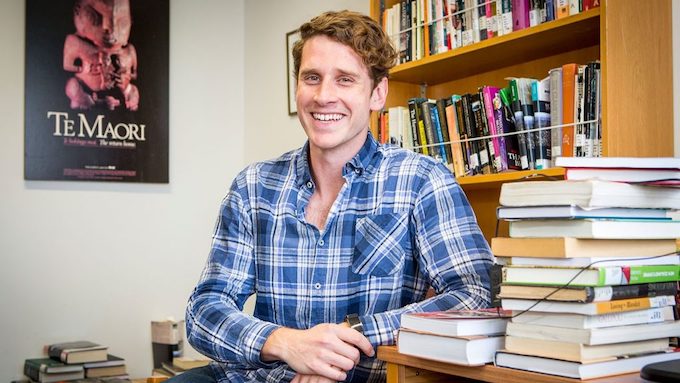
Rowan Light: “One of the enjoyable things about the topic is that everyone has a take on it.” Image courtesy of University of Auckland
One of our most poignant stories, the ill-fated Gallipoli campaign of the First World War and how it’s been remembered, has been a four-year focus for University of Auckland PhD graduand Rowan Light.
“One of the enjoyable things about the topic is that everyone has a take on it,” he says “and how we think about Gallipoli and Anzac Day has changed over time. Since the 1980s especially, it’s become a celebration of nationhood rather than just a sad day of remembrance.”
He believes this shift, and the ever-increasing numbers of young people who flock to Anzac Day services and visit Turkey’s Anzac Cove every year, is a reflection of a broader crisis of identity. “Since the 1960s and our gradual disconnection from the British Empire, Pākehā New Zealanders have been left asking ‘What is our overarching story ? How should we talk and think about our past and about New Zealanders’ and Australians’ relationship to each other’?”
Looking at how Anzac has been memorialised in both countries, he notes how much recent acknowledgement there has been of Māori soldiers’ involvement, and by contrast, the problems of remembering Indigenous Australian military service in Australia.
“In this country, Anzac has now morphed into a way of celebrating the shared experiences of Māori and Pākehā, with the media – particularly Māori Television – playing a crucial role in promoting te reo, running day-long live coverage of Anzac commemorations from a Māori point of view, and telling stories of Te Hokowhitu-a-Tū (the first Māori contingent) involvement at Gallipoli.”
A total of 2700 Māori and Pacific men served in the New Zealand Expeditionary Force during the First World War, while 70 Indigenous Australian men are believed to have served in Gallipoli, 13 of whom were killed in action. It’s estimated that between 1000 and 1300 Indigenous soldiers were part of the Australian Imperial Force and around 300 died in total.
We should be asking the broader questions like, ‘How do we commemorate, think and talk about colonisation and our own New Zealand Wars’. –
We now have a heightened sense of biculturalism,” says Rowan, “but around the time of the First World War there was a big reluctance to include non-white populations in the Anzac forces. However as the war progressed and the body count grew, they were required and sent in larger numbers.”
He says that in New Zealand the public saw, over time, Māori involvement marked and recorded on some level, either in the form of a monument, a website or a book. However in Australia until recently, “the involvement of Indigenous Australians has been a vacuum, a complete erasure in official recognition. They have been excluded from public spaces such as the Australian War Memorial.”
It was only in 2015 that a memorial was dedicated to Indigenous Australian military service in Sydney’s Hyde Park. “It was an important moment because Aboriginal and Torres Strait Islander men and women had been ‘good enough’ to go to war for Australia, but not it seemed, to be remembered afterwards.”
He says Māori also faced discrimination when they returned from the wars, so it’s not about suggesting that New Zealanders have enjoyed perfect race relations. “But it does point to what’s fruitful about having these two histories alongside each other – showing what’s similar but also different in Australia and New Zealand.”
He believes there are also challenges – on both sides of the Tasman – in commemorating military violence that happened on our own shores: frontier warfare in Tasmania and Queensland, for example, or the wars of Waikato and Taranaki, which have recently been recovered in public commemoration through He Rā Maumahara Day of Commemoration on 28 October.
“Studying the history of war commemoration tells us a lot about how remembrance is shaped by dedicated individuals, groups and institutions – from government policy to local community projects, and the role of media,” he says.
“There’s no dedicated Indigenous broadcaster in Australia, which partly explains the lack of media focus and shows the importance of public investment in independent Indigenous media to empower local communities.”
Anzac Day, particularly in New Zealand, should be viewed as part of a bigger story rather than a central story in itself, he believes.
“We should be asking the broader questions like, ‘How do we commemorate, think and talk about colonisation and our own New Zealand Wars, for example? And how can this remembrance contribute to greater healing and understanding for contemporary New Zealanders? I’m keen for my research to spark debate and interest in the way we think about ourselves.”
Rowan Light plans to turn his PhD thesis on Anzac memorialisation in New Zealand and Australia into a book. He will graduate with a PhD in history from the University of Auckland in May, 2020. This article is shared with permission from the University of Auckland.
A new report from the University of Auckland’s Our Voices Project asks young people what…
The government has opened a tender for new standardised assessment tests, leaving educators shocked and…
Early in her career, Kiri Turketo found inspiration in an unlikely source. In this Principal…
Real stories of dedication, challenges, and triumphs from educators in NZ. Part six comes from…
Is fast furniture impacting your school's environmental footprint? We explore eco-friendly solutions to reduce furniture…
A new report from the New Zealand Initiative argues we need a stronger and clearer…
This website uses cookies.